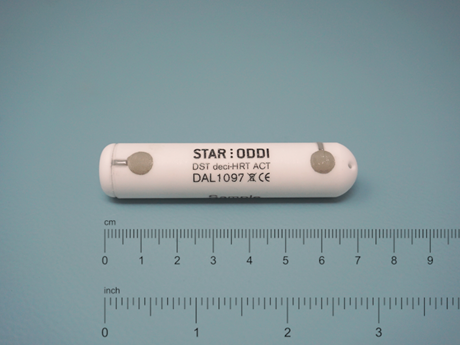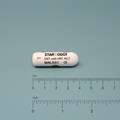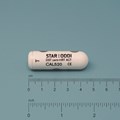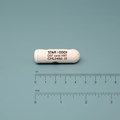DST deci-HRT ACT
Implantable Heart Rate, Activity and Temperature Archival Tag
Long-term overview of changes in fish or aquatic animal heart rate, activity, and temperature. Minimally invasive, leadless, and simple to implant.
The most comprehensive tool on the market to measure individual physiological response of fish for extended period of time. Enables long term aquaculture monitoring, welfare, thermal tolerance, and swimming physiology.
Key features
- Small, size 15 mm x 70 mm, 27g, long battery life
- Leadless, minimally invasive
- Statistical and raw 3-axis accelerometer data
- ECG derived heart rates as low as 4bpm
- Guaranteed pressure tolerance to 800 m
- Description
- Conductivity Sensor
- Using the logger
- Specifications
- Accessories
- Implantation
- Documentation
- Description
Miniature in size and long battery life
The DST deci-HRT ACT is a small, powerful heart rate, activity and temperature logger that weighs 27 g in air, with a diameter of 15 mm and length of 70 mm. Long-term heart rate and activity studies are simple to set up. You can expect a battery life lasting several months, typically between 5-45 months*, depending on sampling frequency and measurement interval.
*Sampling frequency every 2-20 minutes
Published data from several fish species
Star-Oddi loggers, available in five sizes, have been used successfully in several publications in various salmonid and other fish species. Fish weighing from approximately 120g up to several kg.
The DST deci-HRT ACT is ideal for use in physiological and behavioural research on aquatic animals over 1100g. Published studies include thermal tolerance and swim speed tests.
Miniature in size and minimally invasive
The heart rate and activity logger DST deci-HRT ACT simultaneously measures long-term heart rate, activity, and body temperature. The logger has no external wires, which makes it especially simple to implant. The logger is hermetically sealed for biocompatibility.
For advice on implantation, please contact us.
Application
This bio-logging tag is ideal for a variety of studies including those looking at welfare, behaviour, stress response, swimming physiology and physiological response to environmental variations, including temperature and hypoxia. It is suitable for use in fish and other aquatic animals.
Correlation between heart rate and activity
Fish and aquatic animal scientists can identify correlation between heart rate and activity in the animal, for example when measuring stress response or swimming behaviour. The logger comes with the option of programming either two or three parameters: activity and temperature, heart rate and temperature or activity, heart rate and temperature.
Leadless ECG Derived Heart Rate as low as 4bpm
Heart rate is derived from a leadless single channel ECG. As the electrodes are part of the housing the logger is especially easy to implant. The logger takes a measurement of ECG (e.g. 15 second long) at a set time interval and calculates the mean heart rate for each recording. The logger can measure heart rates ranging from 4*-1022 bpm. For validation purposes, individual ECG measurements can be saved. In addition, each measurement is graded with a quality index (QI).
*Minimum heart rate depends on ECG sampling frequency and setup.
Statistical and raw 3-axis accelerometer data
Each activity measurement is recorded over a one-minute period with a 3-axis accelerometer, using a user programmable sampling frequency of 0.03Hz-10Hz. The on-board algorithm of the logger provides six statistical parameters for each one-minute measurement including: minimum, maximum, and average EA* values, variance of EA, skewness, and kurtosis. Raw accelerometer data can be stored for additional calculations such as tailbeat frequency (TBF) and tailbeat amplitude (TBA).
*EA stands for “external acceleration”, an individually calibrated and normalized variable comparable to the vectoral sum of the dynamic body acceleration (VeDBA).
Stress-free long-term studies
The logger has a typical battery life of over 1 year, when sampling activity, heart rate, and temperature every 15 minutes for the individual fish or aquatic animal, e.g., Atlantic Salmon. The logger can measure individual physiological response to stressful events or environmental challenges in commercial aquaculture net pens, without the interference of humans.
Optimize battery life and memory with multiple intervals
Optionally, the loggers can be programmed with multiple different intervals within a study. This can, for example, be useful when different intervals are preferred during the day or night and can optimize battery life and save memory at the same time.
Guaranteed accuracy and performance
Every logger is individually calibrated and comes with a calibration certificate. We guarantee the loggers’ accuracy and performance for one year after production.








